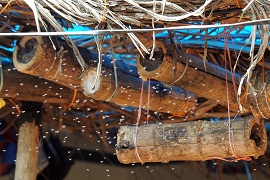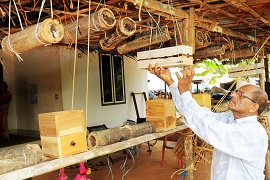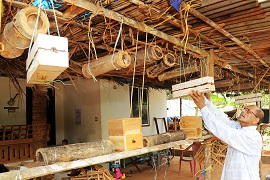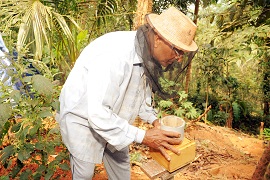Shri Udayan, a driver-turned-meliponiculturist, shows the way of enhancing the income by venturing into meliponiculture . Being a temporary driver with the KSRTC and earning a mere income of Rs. 7,000 per month, Shri Udayan found it to be very difficult to meet his expenditures.


Shri Udayan contacted the Krishi Vigyan Kendra, Kasaragod to learn about the Indian bees keeping and explore the possibilities of starting the meliponiculture as a micro-enterprise. He found the venture to be really helpful for him as the venture required no additional land. As, the land was one of the major constraint for Shri Udayan to take up the agri-enterprises involving the cultivation of crops.
He owns around 60 cents of land that is densely packed with the diversified crops, such as, coconut palms (37 nos.), pepper (97 nos.), banana, betel leaf, different types of vegetables along with a cow. So, in such a situation, Shri Udayan found beekeeping to be the best option as it could be done with his limited land resources and that too without hampering the existing farming system.
Technology Intervention:
Shri Udayan underwent three-day Meliponiculture Training Programme at the Krishi Vigyan Kendra.

During his initial period of starting his venture, Shri Udayan contacted Shri Ambu, an ex-trainee of KVK. He arranged the bee boxes of standard specifications and started the hiving of natural colonies. In the process, he sought the practical experience and expertise of Shri Ambu. Together, they initiated their enterprise with five colonies, which they hived from bamboo nodes of nearby areas. Later, he started locating the colonies by observing the foraging bees and hiving it at weekly intervals. From his experience, he found that in the large areas with the wild vegetation, small bees prefer to colonize in dried bamboo poles as compared to hollows or cavities of wild trees. Further, he improvised the idea as to bring natural colonies in bamboo nodes as such and divide the colonies based on the strength of the colony at a later period to sell the colonies.
The process led to increase the number and weight of coconuts in his garden considerably and on an average, the yield from one palm increased to 93 nuts per year as compared to the previous yield of 66 nuts. Similarly, the average weight of one nut has now increased to 530 g (490-560g), whereas, it was 425 g (385-450 g) prior to the establishment of the bee colonies. Further, the establishment of bee colonies resulted in more and bigger fruits in cucurbitaceous crops, such as, cucumber and bitter guard cultivated as intercrops in his coconut homesteads.
Economic Gains:

At present, Shri Udayan is able to collect 5 to 7 natural colonies per week. Now he has around 300 stingless bee colonies in his unit. He had sold around 600 colonies @ Rs. 1,200 per colony and around 100 kg of honey @ Rs. 1,500 per kg; thereby has earned Rs. 8,70,000/- in the last three years. He is also maintaining around 70 Indian bee colonies in his farm. Both types of honey (honey from Indian bees and stingless bees) are being marketed under the brand name titled “Unique Honey”. The stingless bee honey is unique in terms of nutraceutical value, aroma and taste.
Stingless bee honey is quite heavy in demand due to medicinal qualities of the honey extracted from the stingless bees (dammer bees) and the availability of pure honey is comparatively less. The average annual yield per colony is only 400 g (ranging from 200 g to 900 g).
During the Year - 2017-18, Shri Udayan earned a total income of Rs. 4,25,000/- (Rs. 60,000 from 4,995 Nos. coconuts; Rs. 75,000/- from 50 kg stingless bee honey; Rs.1,80,000/- from 150 stingless bee colonies; Rs.1,20,000/- from four quintals of Indian bee honey) from the agriculture and allied operations. While, during the Year - 2013-2014, he could manage to earn the income of around Rs. 60,000/- only without beekeeping.
Horizontal spread:
Being motivated and inspired by Shri Udayan, large number of youths in his village are approaching the enterprise that is serving as a demonstration unit by the Krishi Vigyan Kendra for those who are interested in starting the meliponiculture. Shri Udayan’s successful enterprise has also been given a vast and wide coverage in the local and national newspapers and TV channels. Considerably, a huge demand for the colonies and honey from all over the districts of Kerala and other states shows the impact created by Shri Udayan’s enterprise among the farming community.
Viability of enterprise:
The enterprise has also successfully created the self-employment opportunities for those who had taken colonies from them apart from higher earnings. Seeing the fruitful results of the enterprise, a proposal for a project on Honey Village with the objective of establishing one stingless bee colony in each homestead of that village leading to food and nutritional security has also been submitted by the Karadka Panchayath.
Employment opportunities:
Having the potential for developing the self-employment opportunities for the rural and tribal farm families, the enterprise is one of the ideal and highly promising enterprises, helping the women and youngsters in generating the additional income.
The pivotal role of the stingless bees to achieve the food security with the help of enhanced pollination, fruit set and quality farm produces as well as nutritional security through the yield of delicious and nutraceutical honey, can be taken up as an entrepreneurship development initiative for attracting the youth towards the agriculture and also to enhance income.
(Source: ICAR-Krishi Vigyan Kendra, ICAR-CPCRI, Kasaragod, Kerala 671124)







फेसबुक पर लाइक करें
यूट्यूब पर सदस्यता लें
X पर फॉलो करना X
इंस्टाग्राम पर लाइक करें